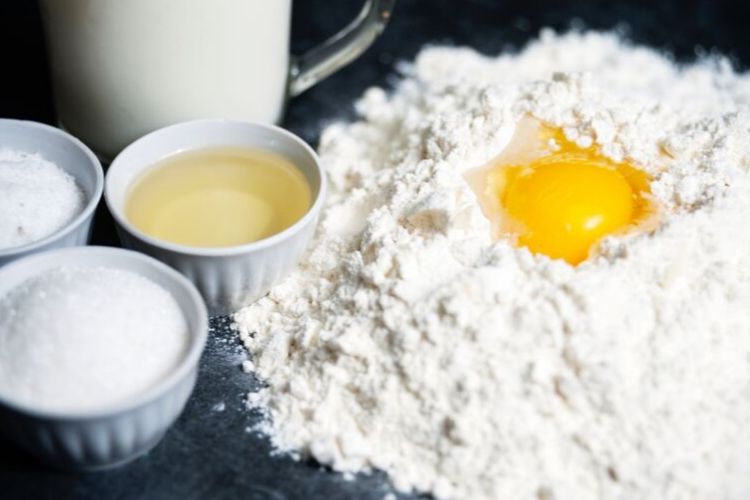
Baking powder is an important ingredient in baking that helps raise or leaven your baked goods and lighten their texture. It’s what makes your baked breads and cakes fluffy. If you enjoy low-carb cooking and baking using keto-friendly almond flour or coconut flour, you may be wondering about the carb content of baking powder.
It’s Time To Take -> The 28-Day Keto Challenge!
Although the vast majority of baking powder brands contain corn starch, which isn’t recommended on keto, a little baking powder, like the amount called for in recipes, won’t set your diet back.
Since only one teaspoon of baking powder is typically used for each cup of flour, baking powder can be used on a low carb diet, like Keto. Each teaspoon contains a little over a gram of carbs.
Baking soda is not to be confused with baking powder, although baking powder contains baking soda. Sodium Bicarbonate (baking soda) is an ingredient in baking powder. Keep reading to find out the difference between the two and discover some interesting health benefits of baking soda.
How Many Carbs are in Baking Powder?
There are 1.3 grams of carbs per teaspoon of baking powder.
How Many Calories are in Baking Powder?
One teaspoon of baking powder contains 2 calories.
Nutrition Facts
| Amount: 1 Teaspoon of Baking Powder | |
| Calories 2 | |
| Total Fat 0 grams | 0% |
| Saturated fat 0 grams | 0% |
| Polyunsaturated fat 0 grams | |
| Monounsaturated fat 0 grams | |
| Cholesterol 0 milligrams | 0% |
| Sodium 487.6 milligrams | 20% |
| Potassium 0.9 milligrams | 0% |
| Total Carbohydrate 1.3 grams | 0% |
| Dietary fiber 0 grams | 0% |
| Sugar 0 grams | |
| Protein 0 g | 0% |
| Vitamin A | 0% | Vitamin C | 0% |
| Calcium | 27% | Iron | 2% |
| Vitamin D | 0% | Vitamin B-6 | 0% |
| Cobalamin | 0% | Magnesium | 0% |
What is Baking Powder?
Baking powder is used to increase the volume of baked goods and lighten their texture. Baking powder releases carbon dioxide gas into the batter or dough. This acid-based reaction causes bubbles in the batter that causes your batter or dough to rise.
Baking powder is made up of sodium bicarbonate (baking soda), cream of tartar; and corn starch.
Baking powder can be used to bake anything from waffles to banana bread within a short period of time. Before baking powder was invented, yeast or beaten egg whites were used to raise baked goods. Activating yeast or whipping eggs takes a longer time to prepare. Now a days we just need to open a canister of baking powder and add a teaspoon or two.
Baking Powder Price
The price of a container of baking powder can range by brand and size, but you can usually pick up a container for around $2 to $5.
Popular Baking Powder Brands
- Magic
- Argo
- Market Pantry Double Acting
- Rumford Aluminium-Free
- Kraft Calumet
- Royal
- Davis
- Clabber Girl
- Foster Clark’s
Is Baking Powder and Baking Soda the Same?

Baking powder contains baking soda. It is a mixture of baking soda, cream of tartar, and usually corn starch.
Both baking soda and baking powder are leavening agents. They can both be added to recipes before baking to help your baked goods rise and become light and fluffy.
Although baking powder contains baking soda, the two products are used under different conditions.
Health Benefits of Baking Soda
One of the important ingredients in baking powder is sodium bicarbonate (baking soda). Baking soda is associated with some amazing health benefits:
- Baking soda can neutralize stomach acid and treat heartburn. Dissolve a teaspoon of baking soda in a glass of cold water and drink the mixture slowly to treat acid reflux disorders.
- In a study of adults with chronic kidney failure, it was determined that subjects who took baking soda as a supplement were less likely to rapidly develop kidney failure than those taking a placebo.
- Baking soda has the potential to improve some cancer treatments. Research shows that baking soda could improve the efficacy of chemotherapy treatments by creating a less-acidic environment for tumors. While no scientific studies have found that baking soda cures cancer, research does show that it can boost some cancer treatments. Some chemotherapy drugs require alkaline conditions in the body. Others medications become more toxic in an acid environment. That’s why some doctors suggest supplementing with sodium bicarbonate for best results.
- Use baking soda to treat insect bites and stings. It can soothe the redness, itching, and stinging from insect bites.
Uses of Baking Soda
- Baking soda can be used to neutralize odors in your refrigerator. Keep an open box of baking soda in the fridge to combat fridge odors.
For Skin
- Use baking soda as deodorant. Baking soda can eliminate the smell of sweat by reducing the acidity of your sweat, neutralizing body odors. Try patting baking soda on your armpits, or create your own natural deodorant by combing baking soda with coconut oil and applying it to your underarms.
- Relieve sunburns and itchy skin.
- Baking soda can be added to the bath to smooth skin and treat calluses.
For Teeth
- Use Baking soda to make mouthwash. Add half a teaspoon of baking soda to half a glass of warm water, and then swish and gargle. This mouth rinse is great for keeping your mouth clean and healthy. It also contains antibacterial and antimicrobial properties that combat harmful bacteria.
- Baking soda is a great treatment for canker sores in the mouth. Gargle with baking soda and water to reduce the pain and swelling of canker sores.
- Baking soda can be used to brighten your smile. Since baking soda has mild abrasive properties, it can break the bonds of molecules that stain the teeth, making them whiter!
For Cleaning
- Add half a cup of baking soda to your regular amount of laundry detergent to boost cleaning power. This combination is tough on stains but gentle on your delicates.
- To use baking soda as a multipurpose cleaner, make a paste by mixing baking soda with a small amount of water. Add in a few splashes of white vinegar for extra cleaning power. Apply the solution to any surface with a sponge and scrub. This solution makes a great cleaning product because it doesn’t use chemicals and it’s safer than other cleaners, especially if you have pets.
- A combination of baking soda and vinegar can remove the most stubborn carpet stains. Use this solution to clean your toilets and remove mold from your shower tiles and bathtub.
- Baking soda is an effective alternative to commercial silver polishes. Use it to polish all your silverware and jewelry.
Side Effects

Common side effects of baking soda include:
- Increased thirst.
- Gas and bloating.
- Stomach cramps.
Contact your doctor if any of these symptoms persist.
Long-term and overuse of baking soda can increase your risk for:
- Potassium deficiency in the blood.
- Chloride deficiency in the blood.
- Increased sodium levels.
- Increased stomach acid production.
- May worsen kidney disease.
- May worsen heart failure.
- Cramps or muscle weakness.
Some brands of baking powder may contain aluminum which isn’t safe to ingest, as it is associated with Alzheimer’s and dementia. Avoid these brands of baking powder.
Baking soda does not contain aluminum.
Related Questions:
Is Baking Powder Gluten-Free?
Most brands of baking powder are gluten-free. In the United States, baking powder is typically made with corn starch or potato starch, and is therefore gluten-free. In countries outside the United States, such as in the United Kingdom, some brands of baking powder may contain wheat starch, so always check the ingredients label.
What is the Best Keto-Friendly Baking Powder Brand?
Rumford Baking Powder is a great carb-free and aluminum-free brand.
The carb count of most baking powder brands is pretty low, a little over 1 gram of carbs per teaspoon. Most recipes don’t call for much more than this amount, so any brand of baking powder can be factored into your daily carb count with ease.
What Are Some Baking Powder Substitutes?
- If you need a teaspoon of baking powder in a recipe, use a half teaspoon of cream of tartar with a quarter-teaspoon of baking soda.
- If you don’t have the cream of tartar on hand in your pantry, you can still use baking soda as a base for a baking powder substitute.
- Yeast can be used in place of baking powder to make the dough rise.
- You can use lemon juice, buttermilk, or milk combined with equal parts vinegar as your acid.
- A beaten egg is another great substitute for baking powder to help baked goods become light and airy.
